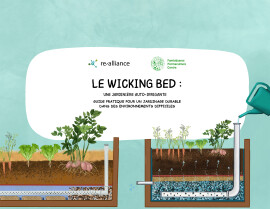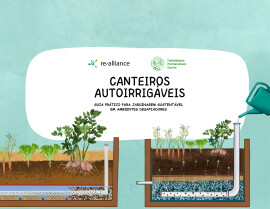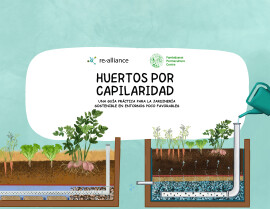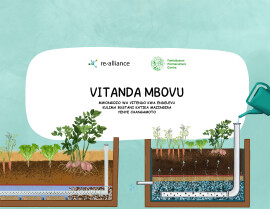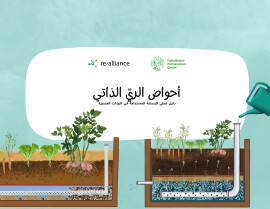
Biological and Cultural Diversity
The role of indigenous agricultural experimentation in development
Gordon Prain, Sam Fujisaka, D Michael Warren
Much recent 'scientific' agricultural research has failed to build upon the valuable experiences and lessons learnt from farmers, in combating problems faced in agriculture. Biological and Cultural Diversity presents, for the first time, cases of indigenous experimentation as well as the benefits in terms of rural development of new partnerships between farmers and formal research. Development workers, agricultural researchers and others concerned about rural poverty, agricultural sustainability and local resource management will find this book highly relevant and of value to their work. Published in the IT Studies in Indigenous Knowledge and Development series
Published: 1999
Pages: 224
eBook: 9781780444574
Paperback: 9781853394430
| Preface | |||
|---|---|---|---|
| Notes on Contributors | |||
| Introduction 1 | |||
| 1 Rice cropping practices in Nepal: indigenous adaptation to adverse and difficult environments 6 | |||
| 2 Farmer-based experimentation with velvetbean: innovation within tradition 32 | |||
| 3 Side-stepped by the Green Revolution: farmers' traditional rice cultivars in the uplands and rainfed lowlands 50 | |||
| 4 Environmental dynamics, adaptation and experimentation in indigenous Sudanese water harvesting 64 | |||
| 5 The indigenization of exotic inputs by small-scale farmers on the Jos Plateau, Nigeria 80 | |||
| 6 Farmer management of rootcrop genetic diversity in Southern Philippines 92 | |||
| 7 Farmer experimentation in a Venezuelan Andean group 113 | |||
| 8 Indian farmers opt for ecological profits 125 | |||
| 9 Indigenous agricultural experimentation in home gardens of South India: conserving biological diversity and achieving nutritional security 134 | |||
| 10 Living local knowledge for sustainable development 147 | |||
| 11 Varietal diversity and farmers' knowledge: the case of the sweet potato in Irian Jaya 158 | |||
| 12 The indigenous concept of experimentation among Malian farmers 163 | |||
| 13 Umnotho Wethu Amadobo: the clash between indigenous agricultural knowledge and a Western conservation ethic in Maputaland, South Africa 172 | |||
| 14 Local-level experimentation with social organization and management of self-reliant agricultural development: the case of gender in Ara, Nigeria 184 | |||
| 15 Chinese farmers' initiatives in technology development and dissemination: a case of a farmer association for rural technology development 192 | |||
| Notes 199 | |||
| References 202 |
Gordon Prain Gordon Prain, Regional Director, International Potato Centre, East, Southeast Asia and the Pacific Division, Jakarta, Indonesia.
Sam Fujisaka Sam Fujisaka, Agricultural Anthropologist, CIAT, Colombia.
D Michael Warren Professor Dennis Michael Warren was an anthropologist and leading Africanist scholar who taught at Iowa State University from 1972 to1997. Professor Warren was especially interested in indigenous knowledge and rural development in Africa. His interest in indigenous knowledge led him to the study of art, culture, the rural economy and traditional healing in Ghana and Nigeria and to comparative studies of other societies.
PLASTIC YAM AND PLASTIC YAM STICKS – PERSPECTIVES ON INDIGENOUS TECHNICAL KNOWLEDGE AMONG JAMAICAN FARMERS
BARKER, DAVID
BECKFORD, CLINTON
Tijdschrift voor Economische en Sociale Geografie, Vol. 97 (2006), Iss. 5 P.535
https://doi.org/10.1111/j.1467-9663.2006.00362.x [Citations: 9]New Approaches to Supporting the Agricultural Biodiversity Important for Sustainable Rural Livelihoods
Vernooy, Ronnie
Song, Yiching
International Journal of Agricultural Sustainability, Vol. 2 (2004), Iss. 1 P.55
https://doi.org/10.1080/14735903.2004.9684567 [Citations: 21]Non-crop and crop plant diversity and determinants in homegardens of Abay Chomen District, Western Ethiopia
Legesse, Abayneh
Biodiversity International Journal, Vol. 2 (2018), Iss. 5 P.433
https://doi.org/10.15406/bij.2018.02.00096 [Citations: 7]El poder transformador de los saberes en paisajes de terrazas
Salas, María Angélica
Tillmann , Timmi
(2021)
https://doi.org/10.51349/veg.2021.1.11 [Citations: 3]The Future of Drylands
Sustainable Management of Marginal Drylands (SUMAMAD): Sharing Success Stories from Indigenous, Adaptive and Innovative Approaches
King, Caroline
2008
https://doi.org/10.1007/978-1-4020-6970-3_63 [Citations: 1]Tropical Soils and Food Security: The Next 50 Years
Stocking, M. A.
Science, Vol. 302 (2003), Iss. 5649 P.1356
https://doi.org/10.1126/science.1088579 [Citations: 187]Using plants for health: Indigenous knowledge in health care in a tribal region of Bihar, India
Tripathi, Sadhna
Varma, Shashi
Goldey, Patricia
International Journal of Sustainable Development & World Ecology, Vol. 7 (2000), Iss. 4 P.321
https://doi.org/10.1080/13504500009470051 [Citations: 1]Jousting with Malthus’ ghost: Environment and conflict after the cold war
Dalby, Simon
Geopolitics, Vol. 5 (2000), Iss. 1 P.165
https://doi.org/10.1080/14650040008407673 [Citations: 5]Tools and Methods for Data Collection in Ethnobotanical Studies of Homegardens
Vogl, Christian R.
Vogl-Lukasser, Brigitte
Puri, Rajindra K.
Field Methods, Vol. 16 (2004), Iss. 3 P.285
https://doi.org/10.1177/1525822X04266844 [Citations: 77]Participatory organic research in the USA and Italy: Across a continuum of farmer–researcher partnerships
Delate, Kathleen
Canali, Stefano
Turnbull, Robert
Tan, Rachel
Colombo, Luca
Renewable Agriculture and Food Systems, Vol. 32 (2017), Iss. 4 P.331
https://doi.org/10.1017/S1742170516000247 [Citations: 13]Assessing Farmers' Knowledge of Weed Species, Crop Type and Soil Management Practices in Relation to Soil Quality Status in Mai‐Negus Catchment, Northern Ethiopia
Tesfahunegn, Gebreyesus Brhane
Tamene, Lulseged
Vlek, Paul L. G.
Mekonnen, Kirubel
Land Degradation & Development, Vol. 27 (2016), Iss. 2 P.120
https://doi.org/10.1002/ldr.2233 [Citations: 21]
